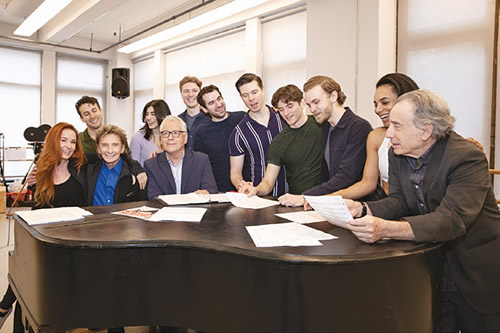
When Barry Manilow, composer, and Bruce Sussman, author and lyricist, first learned about the history of the 1930s singing troupe The Comedian Harmonists, they knew it was a story that had to be told. Fast forward from their first production of the musical in 1997 to March 2022 and there is no doubt that this is a “must see” for today’s New York audiences. And so, under the direction of Warren Carlyle, with Teaneck’s Zalmen Mlotek, artistic director of the National Yiddish Theater Folksbiene in the wings, “Harmony” opened in previews at the Museum of Jewish Heritage – A Living Memorial to the Holocaust on March 23. The show will run through May and will offer evening and matinee performances.
Carlyle and Mlotek told The Jewish Link:: “Every theatrical piece has to begin with a ‘spine sentence.’ The spine sentence for this production is that it is ‘a tale of the quest for harmony in the most discordant of times in history.’ It gave us an opportunity to write a piece whose opening act takes place during the Golden Age of music to the second act which portrays deconstruction from when Hitler rose to power. The fact that our venue is the Museum of Jewish Heritage resonates loudly as this building mirrors the search for peace and harmony that our play expresses.”
“Harmony” is the true story of the Comedian Harmonists, an internationally famous, all-male harmony ensemble that performed between 1928 and 1934 as one of the most successful musical groups in Europe before World War II. Taking the world by storm, the six talented young men sold millions of records, starred in dozens of films, and packed the most prestigious concert halls around the globe.
The group’s success continued into the early 1930s until the world they knew changed forever.
Three of the group’s members—Harry Frommermann, Erich Collin and Roman Cycowski—were Jewish, and a fourth, Erwin Bootz, married a Jewish woman. The Nazis progressively made the group’s professional life more difficult, initially banning pieces by Jewish composers and finally prohibiting them from performing in public.The group’s last concert in Germany was in Hanover on March 25, 1934, after which they sailed to the United States and gave several concerts. Fearing internment if they stayed abroad, they eventually returned to Germany amidst bitter internal strife.
The group split in two, with one group forming in Vienna and a second remaining in Germany. Neither group attained the huge success of the original troupe. The German group was stifled by political in-fighting and heavy censorship. The emigrant group toured Russia, South Africa, South America and Australia. After a North American concert tour in the U.S. in 1940, they were unable to find further work in America because of anti-German sentiment, and split up. Although all the members survived the war, they never re-formed as a musical group.
The Comedian Harmonists remained largely forgotten until filmmaker Eberhard Fechner made a four-hour, black-and-white television documentary in which he interviewed the surviving members in 1975. At the time, they were scattered throughout the world. The documentary aired over two nights in Germany in 1977 and caused a resurgence of interest in their music.
It was this poignant and comprehensive documentary that inspired Manilow and Sussman to collaborate on the new musical “Harmony,” which premiered at the La Jolla Playhouse in 1997 and was presented in Atlanta in 2013 and in Los Angeles in 2014. In 2010, a book by Douglas Friedman, “The Comedian Harmonists: The Last Great Jewish Performers in Nazi Germany” was published. Friedman did an impressive amount of research and included many interviews of descendents and admirers, along with letters, photos and documents attesting to the enormous popularity of the troupe.
Now in New York for a seven-week run, the play has taken on additional relevance and meaning against the background of the world situation. At points it comes across as current as a daily newspaper reporting on the aggression and atrocities being committed in Eastern Europe against innocent civilians in populated areas. The musical recreates a dark period in human history but concludes with the power of love and hope prevailing.
The National Yiddish Theater Folksbiene’s “Harmony” will be showing in previews from March 23 to April 13 (matinee) and then from April 13 (evening) through May 8. Tickets can be purchased at the box office by calling 855-449-4658 or visiting https://nytf.org/harmony/.
Performances are in the Edmond Safra Theater at the Museum of Jewish Heritage, 36 Battery Park, New York, NY 10280.
By Pearl Markovitz













